#Perry V Wade
Text
Team USA is Treading Water
Team USA is treading water. This design by my husband, Perry V Wade is available on a variety of products in our Raygun Planet Spreadshirt shop.
Here’s a link to all the designs in the shop.
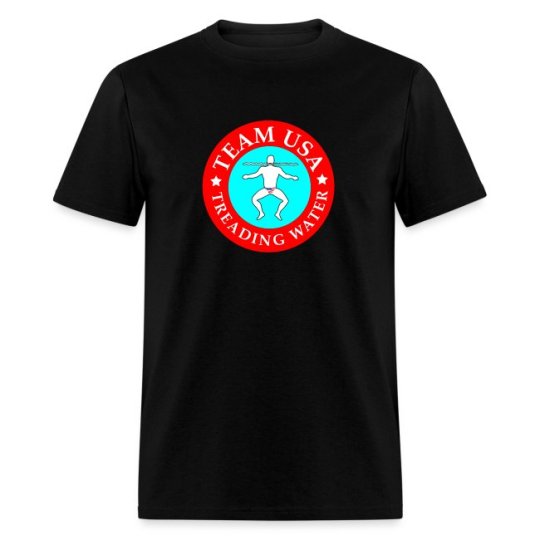
View On WordPress
0 notes
Text
Is hell freezing over?
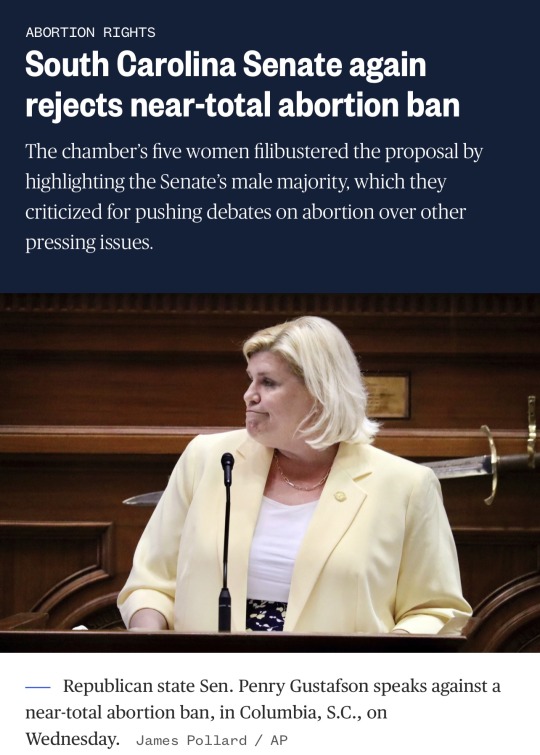
COLUMBIA, S.C. — South Carolina senators rejected a bill that would have banned nearly all abortions in a conservative state that has increasingly served patients across a region where Republican officials have otherwise curtailed access.
A 22-21 vote Thursday marks the third time a near-total abortion ban has failed in the Republican-led chamber since the U.S. Supreme Court reversed Roe v. Wade last summer. Six Republicans helped block motions to end debate and defeated any chance the bill passes this year.
The chamber’s five women filibustered the proposal in speeches highlighting the Senate’s male majority that they criticized for pushing debates on abortion over other pressing issues.
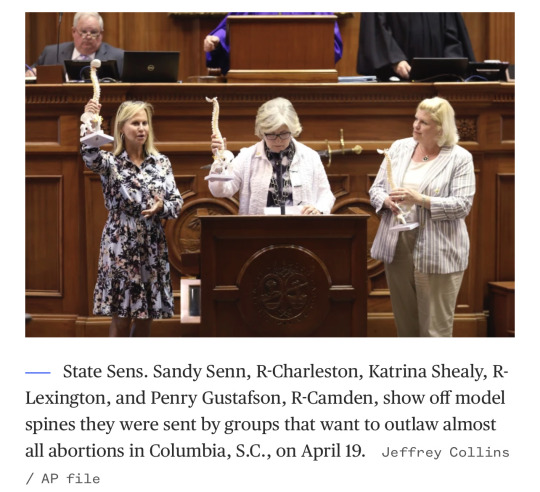
Republican Sen. Penry Gustafson spent over 30 minutes Wednesday detailing the bodily changes throughout every stage of pregnancy. Gustafson said she spoke so long because the millions of women addressed in the bill had not been heard. She emphasized her “pro-life” position but said the proposal left “no room for empathy, reality or graciousness.”
Republican Sen. Sandy Senn criticized Majority Leader Shane Massey for repeatedly “taking us off a cliff on abortion.”
“The only thing that we can do when you all, you men in the chamber, metaphorically keep slapping women by raising abortion again and again and again, is for us to slap you back with our words,” Senn said.
(continue reading)
#politics#republicans#south carolina#reproductive rights#abortion#reproductive justice#roe v wade#healthcare#war on women#perry gustafson#sandy senn#shane massey
458 notes
·
View notes
Text
Character Name Ideas (Male)
So I've been browsing through BehindTheName (great resource!) recently and have compiled several name lists. Here are some names, A-Z, that I like.
NOTE: If you want to use any of these please verify sources, meanings etc, I just used BehindTheName to browse and find all of these. Under the cut:
A: Austin, Aiden, Adam, Alex, Angus, Anthony, Archie, Argo, Ari, Aric, Arno, Atlas, August, Aurelius, Alexei, Archer, Angelo, Adric, Acarius, Achilou, Alphard, Amelian, Archander
B: Bodhi, Bastian, Baz, Beau, Beck, Buck, Basil, Benny, Bentley, Blake, Bowie, Brad, Brady, Brody, Brennan, Brent, Brett, Brycen
C: Cab, Cal, Caden, Cáel, Caelan, Caleb, Cameron, Chase, Carlos, Cooper, Carter, Cas, Cash, Cassian, Castiel, Cedric, Cenric, Chance, Chandler, Chaz, Chad, Chester, Chet, Chip, Christian, Cillian, Claude, Cicero, Clint, Cody, Cory, Coy, Cole, Colt, Colton, Colin, Colorado, Colum, Conan, Conrad, Conway, Connor, Cornelius, Creed, Cyneric, Cynric, Cyrano, Cyril, Cyrus, Crestian, Ceric
D: Dallas, Damien, Daniel, Darach, Dash, Dax, Dayton, Denver, Derek, Des, Desmond, Devin, Dewey, Dexter, Dietrich, Dion, Dmitri, Dominic, Dorian, Douglas, Draco, Drake, Drew, Dudley, Dustin, Dusty, Dylan, Danièu
E: Eadric, Evan, Ethan, Easton, Eddie, Eddy, Einar, Eli, Eilas, Eiljah, Elliott, Elton, Emanuel, Emile, Emmett, Enzo, Erik, Evander, Everett, Ezio
F: Faolán, Faron, Ferlin, Felix, Fenrir, Fergus, Finley, Finlay, Finn, Finnian, Finnegan, Flint, Flip, Flynn, Florian, Forrest, Fritz
G: Gage, Gabe, Grady, Grant, Gray, Grayson, Gunnar, Gunther, Galahad
H: Hale, Harley, Harper, Harvey, Harry, Huey, Hugh, Hunter, Huxley
I: Ian, Ianto, Ike, Inigo, Isaac, Isaias, Ivan, Ísak
J: Jack, Jacob, Jake, Jason, Jasper, Jax, Jay, Jensen, Jed, Jeremy, Jeremiah, Jesse, Jett, Jimmie, Jonas, Jonas, Jonathan, Jordan, Josh, Julien, Jovian, Jun, Justin, Joseph, Joni,
K: Kaden, Kai, Kale, Kane, Kaz, Keane, Keaton, Keith, Kenji, Kenneth, Kent, Kevin, Kieran, Kip, Knox, Kris, Kristian, Kyle, Kay, Kristján, Kristófer
L: Lamont, Lance, Landon, Lane, Lars, László, Laurent, Layton, Leander, Leif, Leo, Leonidas, Leopold, Levi, Lewis, Louie, Liam, Liberty, Lincoln, Linc, Linus, Lionel, Logan, Loki, Lucas, Lucian, Lucio, Lucky, Luke, Luther, Lyall, Lycus, Lykos, Lyle, Lyndon, Llewellyn, Landri, Laurian, Lionç
M: Major, Manny, Manuel, Marcus, Mason, Matt, Matthew, Matthias, Maverick, Maxim, Memphis, Midas, Mikko, Miles, Mitch, Mordecai, Mordred, Morgan, Macari, Maïus, Maxenci, Micolau, Miro
N: Nate, Nathan, Nathaniel, Niall, Nico, Niels, Nik, Noah, Nolan, Niilo, Nikander, Novak,
O: Oakley, Octavian, Odin, Orlando, Orrick, Ǫrvar, Othello, Otis, Otto, Ovid, Owain, Owen, Øyvind, Ozzie, Ollie, Oliver, Onni
P: Paisley, Palmer, Percival, Percy, Perry, Peyton, Phelan, Phineas, Phoenix, Piers, Pierce, Porter, Presley, Preston, Pacian
Q: Quinn, Quincy, Quintin
R: Ragnar, Raiden, Ren, Rain, Rainier, Ramos, Ramsey, Ransom, Raul, Ray, Roy, Reagan, Redd, Reese, Rhys, Rhett, Reginald, Remiel, Remy, Ridge, Ridley, Ripley, Rigby, Riggs, Riley, River, Robert, Rocky, Rokas, Roman, Ronan, Ronin, Romeo, Rory, Ross, Ruairí, Rufus, Rusty, Ryder, Ryker, Rylan, Riku, Roni
S: Sammie, Sammy, Samuel, Samson, Sanford, Sawyer, Scout, Seán, Seth, Sebastian, Seymour, Shane, Shaun, Shawn, Sheldon, Shiloh, Shun, Sid, Sidney, Silas, Skip, Skipper, Skyler, Slade, Spencer, Spike, Stan, Stanford, Sterling, Stevie, Stijn, Suni, Sylvan, Sylvester
T: Tab, Tad, Tanner, Tate, Tennessee, Tero, Terrance, Tevin, Thatcher, Tierno, Tino, Titus, Tobias, Tony, Torin, Trace, Trent, Trenton, Trev, Trevor, Trey, Troy, Tripp, Tristan, Tucker, Turner, Tyler, Ty, Teemu
U: Ulric
V: Valerius, Valor, Van, Vernon, Vespasian, Vic, Victor, Vico, Vince, Vinny, Vincent
W: Wade, Walker, Wallis, Wally, Walt, Wardell, Warwick, Watson, Waylon, Wayne, Wes, Wesley, Weston, Whitley, Wilder, Wiley, William, Wolfe, Wolfgang, Woody, Wulfric, Wyatt, Wynn
X: Xander, Xavier
Z: Zachary, Zach, Zane, Zeb, Zebediah, Zed, Zeke, Zeph, Zaccai
51 notes
·
View notes
Text
The pharmaceutical company Eli Lilly was one of the most vocal opponents of a sweeping anti-abortion law that passed in its home state of Indiana, last August, saying that the measure would make it hard to attract talent and would force it to look outside the state for growth.
But in the weeks and months that followed, Lilly continued to financially support Republican candidates and politicians who support bans on abortion across the country, including many who celebrated the reversal of Roe v Wade.
It was not alone.
A Guardian analysis of other major US companies’ political donations shows that those who suggested they would help female employees skirt statewide abortion bans, by offering to pay for out-of-state medical costs for those seeking abortions in states where the option was illegal, continued to financially back candidates who have called for abortion bans. They include Meta, the company that owns Facebook, Comcast, Citigroup, AT&T, and Amazon.
The analysis suggests that while some of America’s largest employers want to be seen as supporting reproductive health for their female workers and their families, the abortion issue has not affected their financial support for Republican candidates who have promised to further erode those workers’ reproductive rights.
Lilly made financial contributions to Texas state senators anti-choice Republicans Charles Schwertner and Charles Perry, and Texas state speaker Dade Phelan, who has said he does not see any need to change Texas’s current law, which forces women who have been raped to carry their pregnancies to term.
Since Roe was overturned, Lilly has also given financial donations to US senators Rand Paul, Oklahoma’s James Lankford, and Mike Crapo, among others who supported overturning abortion rights. The company did not respond to a request for comment.
Amazon, the second-largest private employer in the US, said it would cover out-of-state abortion travel for employees on its health care plan, but not contractors who make up most of its workforce.
But even as it vowed to help some of its female workers get access to abortion care, it continued to support Republican candidates like Bruce Westerman of Arkansas, who wrote in an op-ed for the Arkansas Democrat Gazette that the fight against abortion was “really just beginning”.
“We will always stand for the rights of the unborn until abortion is not only illegal in all 50 states, but unconscionable,” he wrote.
Amazon’s political action committee also gave donations to David Valadao, a California Republican who co-sponsored a “life at conception” act, which states that it would guarantee a right to life at the “moment of fertilization”, and Tony Gonzales, who has an A+ rating from anti-choice group Susan B Anthony List. Amazon did not respond to a request for comment.
AT&T, the US telecommunications company, has said it would cover the cost of travel for medical procedures within 100 miles of an employee’s home address because it values the health of its employees to make sure they can access “a full range of health care benefits when they need them”.
But the company has also supported dozens of Republican candidates since the 24 June decision to overrule Roe, including Texas’s Jodey Arrington, who has called abortion “a moral stain on the fabric of America” and supports a federal ban on abortion. It has also donated to Greg Steube, a Florida Republican who has said that, with Roe overturned “no misguided judicial decision can block states from applying murder and assault statutes to protect the unborn from abortion”. In Georgia, it supported Republican Andrew Clyde, who has said abortion should be “abolished entirely” except if the mother’s life is at risk, and Barry Loudermilk, who has tweeted the work of the pro-life community was “just beginning” after the Dobbs decision that overturned a federal right to abortion. In Maryland, AT&T supported Republican congressman Andy Harris, who said Dobbs had not created a crisis in healthcare, and Jack Bergman of Michigan who supports a federal ban on abortion.
An AT&T spokesperson said the company’s political action committee has “never based contribution decisions on a legislator’s position on abortion”.
The spokesperson added: “Our employee PACs contribute to candidates in both parties and focus on policies and regulations that are important to investing in broadband networks and hiring, developing and retaining a skilled workforce with competitive wages and benefits. It is inaccurate to assert that contributions to elected officials equate to supporting all of their policy positions.”
In the aftermath of Dobbs, Mark Zuckerberg’s Meta said it would reimburse travel expenses “to the extent permitted by law” for those who need to access out-of-state healthcare and reproductive services. But it also supported – among others – candidates like Don Bacon of Nebraska and Bob Latta of Ohio who co-sponsored a bill to ban abortions federally. A Meta spokesperson did not respond to a request for comment.
Citibank has said post-Dobbs that it would provide travel benefits to employees who need “access to adequate resources” but continued to support Republican candidates who support a national ban on abortion, like John Hoeven of North Dakota. It also donated to Jerry Moran of Kansas, who has said life begins at conception and “supports legislation protecting life at its earliest stages and in all conditions”.
Kara Findlay, head of corporate communications at Citi, declined to comment.
Comcast, the parent company of NBC Universal, has said it would support thousands of dollars of medically necessary travel expenses after Roe was overturned, but continued to make political donations to Republicans who support abortion bans, like Benjamin Cline of Virginia, who once proposed legislation that would mark the anniversary of the Roe v Wade decision as the “Day of Tears”, which would commemorate “59 million lives lost” due to abortion services being protected.
The company did not respond to a request for comment.
30 notes
·
View notes
Text




My 2022 in Books
This year I read 78 books which is a step down from the last few years (all 100+) but I'm trying to read in a more purposeful, slow way, trying to savor and absorb what I read, which is definitely a challenge since I've always been a very speedy reader.
There's a complete list below the cut of all the books, but here were my absolute favorites of this year:
Six of Crows & Crooked Kingdom - Leigh Bardugo
The Miniaturist - Jessie Burton
Dracula - Bram Stoker (Dracula Daily was probably my favorite thing to ever happen on this beloved hellsite in the last 13 years)
The Storyteller - Dave Grohl (I'm not an audiobook person but it was such an experience listening to him read this)
Taste: My Life Through Food - Stanley Tucci
The Essex Serpent - Sarah Perry
Book of Night - Holly Black
The Key to Deceit - Ashley Weaver
Reading Lolita in Tehran - Azar Nafisi
The Bear and the Nightingale - Katherine Arden
The Shadow of the Wind - Carlos Ruiz Zafón
I loved so many of the others too, don't get me wrong, but those are the ones I know I'll be re-reading again before long (especially Six of Crows & Crooked Kingdom, which I wanted to start reading again the very minute I finished them).
Off to start my 2023 reads now!
A Spindle Splintered - Alix E. Harrow
Ruin and Rising - Leigh Bardugo
Ruin and Rising - Leigh Bardugo
The Tea Dragon Society - Kay O’Neill
The Tea Dragon Tapestry - Kay O’Neill
The Tea Dragon Festival - Kay O’Neill
Flight, Vol. 7 - ed. Kazu Kibuishi
Boxers - Gene Luen Yang
Saints - Gene Luen Yang
The Fire Never Goes Out: A Memoir in Pictures - N.D. Stevenson
Gunpowder: Alchemy, Bombards, and Pyrotechnics: The History of the Explosive that Changed the World - Jack Kelly
Cemetery Boys - Aidan Thomas
The Eye of the World - Robert Jordan
These Violent Delights - Chloe Gong
This Is How You Lose The Time War - Amal El-Mohtar and Max Gladstone
Burning Down The Haus: Punk Rock, Revolution, and the Fall of the Berlin Wall - Tim Mohr
The Puzzle Women - Anna Ellory
An Age Of License: A Travelogue - Lucy Knisley
True Love Bites - Joy Demorra
The Bear and The Nightingale - Katherine Arden
Shadow of Night - Deborah Harkness
Under The Whispering Door - T.J. Klune
Rivers of London: Body Work - Ben Aaronovitch
Six of Crows - Leigh Bardugo
The Disappearing Spoon: And Other True Tales of Madness, Love, and the History of the World from the Periodic Table of the Elements - Sam Kean
Home and Exile - Chinua Achebe
Clanlands: Whisky, Warfare, and a Scottish Adventure Like No Other - Sam Heughan and Graham McTavish
Our Violent Ends - Chloe Gong
The Invisible Life of Addie LaRue - V.E. Schwab
The Paris Apartment - Lucy Foley
The Miniaturist - Jessie Burton
Dog Sees God: Confessions of a Teenage Blockhead - Bert V. Royal
Death in the Air: The True Story of a Serial Killer, the Great London Smog, and the Strangling of a City - Kate Winkler Dawson
The Devil and the Dark Water - Stuart Turton
Crooked Kingdom - Leigh Bardugo
Portrait of a Thief - Grace D. Li
The Storyteller: Tales of Life and Music - Dave Grohl
The Sun Also Rises - Ernest Hemingway
The Key to Deceit - Ashley Weaver
The Essex Serpent - Sarah Perry
Book of Night - Holly Black
Cryptid Club - Sarah Andersen
Taste: My Life Through Food - Stanley Tucci
Booty: Girl Pirates on the High Seas - Sara Lorimer
The House in the Cerulean Sea - T.J. Klune
hir - Taylor Mac
All Boys Aren’t Blue - George M. Johnson
The Wedding Date - Jasmine Guillory
Are Prisons Obsolete? - Angela Y. Davis
Other Birds - Sarah Addison Allen
Dracula - Bram Stoker
Demon in the Wood - Leigh Bardugo
The 39 Steps - John Buchan
Wade in the Water: Poems - Tracy K. Smith
Reading Lolita in Tehran: A Memoir in Books - Azar Nafisi
Mexican Gothic - Silvia Moreno-Garcia
The Five Orange Pips - Arthur Conan Doyle
She Who Became The Sun - Shelley Parker-Chan
While Justice Sleeps - Stacey Abrams
Cinnamon - Neil Gaiman
The Five: The Untold Lives of the Women Killed by Jack the Ripper - Hallie Rubenhold
Persuasion - Jane Austen
Illuminae - Amie Kaufman and Jay Kristoff
Neverwhere - Neil Gaiman
No Bones - Anna Burns
Mercury - Hope Larson
Iron Widow - Xiran Jay Zhao
Crime and Punishment - Fyodor Dostoyevsky
A Christmas Carol - Charles Dickens (re-read)
The Shadow of the Wind - Carlos Ruiz Zafón
Ma Rainey’s Black Bottom - August Wilson
Year of the Reaper - Makiia Lucier
The Ten Thousand Doors of January - Alix E. Harrow
Paper Girls, Volumes 1-6 - Brian K. Vaughan
#bookblr#currently reading#well not currently but I want to keep this in that tag for later#books#2022 reads
2 notes
·
View notes
Text

The Fourteenth Amendment (Amendment XIV) to the US Constitution was adopted on July 9, 1868, as one of the Reconstruction Amendments. Arguably one of the most consequential amendments to this day, the amendment addresses citizenship rights and equal protection of the laws and was proposed in response to issues related to former slaves following the American Civil War. The amendment was bitterly contested, particularly by the states of the defeated Confederacy, which were forced to ratify it to regain representation in Congress. The amendment, particularly its first section, is one of the most litigated parts of the Constitution, forming the basis for landmark decisions such as Brown v. Board of Education regarding racial segregation, Roe v. Wade regarding abortion, Bush v. Gore regarding the 2000 presidential election, and Obergefell v. Hodges regarding same-sex marriage. The amendment limits the actions of all state and local officials, including those acting on behalf of such an official.
The amendment’s first section includes several clauses: the Citizenship Clause, Privileges or Immunities Clause, Due Process Clause, and Equal Protection Clause. The Citizenship Clause provides a broad definition of citizenship, nullifying the SCOTUS decision in Dred Scott v. Sandford, which held that Americans descended from African slaves could not be citizens of the US. Since the Slaughterhouse Cases, the Privileges or Immunities Clause has been interpreted to do very little.
The second, third, and fourth sections of the amendment are seldom litigated. However, the second section’s reference to “rebellion, or other crime” has been invoked as a constitutional ground for felony disenfranchisement. The fourth section was held, in Perry v. the US, to prohibit a current Congress from abrogating a contract of debt incurred by a prior Congress. The fifth section gives Congress the power to enforce the amendment’s provisions by “appropriate legislation”, under City of Boerne v. Flores, this power may not be used to contradict a SCOTUS decision interpreting the amendment. #africanhistory365 #africanexcellence
1 note
·
View note
Text
Elizabeth Dias and Lisa Lerer’s ‘The Fall of Roe’ Review

Sleeping Giants
A new book charts the fall of Roe and the failures of the liberal Establishment.
Remember Wendy Davis?
For a brief moment in 2013, Davis, then a Texas state senator, captured the nation’s attention with a dramatic gambit.
The Democrat filibustered an anti-abortion bill, spending 13 hours on her feet while reading research and testimonies from women who opposed the legislation.
(A doctor had inserted a catheter into her bladder so she could accomplish the feat.)
Images of Davis in her pink sneakers spread across the internet.
Writer Sally Kohn would later call the shoes “a talisman of feminism and political voice and literally standing up for what’s right.”
By the end of the evening, pro-choice activists had crowded into the rotunda of the state capitol, and prominent Democrats had signaled their support for Davis in public.
youtube
Thanks to her efforts, the bill died.

As New York Times reporters Elizabeth Dias and Lisa Lerer document in their new book, The Fall of Roe: The Rise of a New America, liberals thought that with Davis on their side, “they were watching democracy at work.”
She’d given them reason to hope, and they believed that she would ultimately triumph over their Republican foes.
“A new Texas and a new America were here,” write Dias and Lerer, and for a handful of weeks that seemed true.
Davis became a meme:
In one, she was America’s very own Daenerys Targaryen.
At the Newseum in Washington, then–Planned Parenthood president Cecile Richards hosted a cocktail party for supporters with condoms as party favors.
Then the hammer fell.
Just under three weeks after Davis finished her filibuster, Republicans called a special session.
This time, the bill passed. Dias and Lerer write that Planned Parenthood announced that it would close three clinics on the day Governor Rick Perry signed the bill.
Even after S.B. 5 passed, Richards believed their fight had “woken up a sleeping giant” in the form of pro-choice voters in Texas.
It was a somewhat reasonable conclusion at the time.
Barack Obama had just won reelection, Davis had generated intense public interest, and in national polling, the public supported the right to legal abortion.
But look closely at this façade, as Dias and Lerer have, and the cracks are evident.
The Obama presidency gave way to four years of Donald Trump, who appointed three conservative jurists to the Supreme Court, who in short order overturned Roe v. Wade.
A Democrat is president again, but he faces a difficult race against Trump.
Will the fall of Roe awaken the sleeping giant at last?
Voters say overwhelmingly that the Supreme Court ruling that overturned Roe was wrongly decided, and public outrage has helped Democrats outperform expectations in the elections since that ruling.
This year, Democrats are counting on abortion to help Biden win a second term.
But then as now, overconfidence can be fatal.
The Fall of Roe unfolds like a horror story.
Danger lurked outside the cabin door, but the threat was never fully perceived by those who lived within.
Dias and Lerer depict a liberal Establishment that behaved as though it had permanently won.
“Roe loomed so large in American life that it was almost impossible to imagine that it could disappear,” they write.
“Every election Democrats and their allies in the abortion rights movement warned voters about the potential consequences to abortion rights, should they vote Republican,” but they didn’t really believe that Roe would one day fall.
Yet as institutions like Planned Parenthood grew flush with cash, activists closer to the ground and who were more exposed to danger warned of trouble.
A constellation of “smaller, largely Black and Hispanic abortion-rights organizations” knew that restrictions had already eroded the right to abortion.
Though the big abortion-rights groups considered the Affordable Care Act a major success, the law reaffirmed the Hyde Amendment, which banned federal funding for abortion care and mostly affected poor women.
“To the Black and Hispanic reproductive justice activists, the new health care law, which left the Hyde Amendment intact, was a sign that the biggest organization in their world was willing to trade away their rights,” write Dias and Lerer.
Democrats didn’t have the votes to end Hyde, as Dias and Lerer point out; the party’s big-tent approach to abortion had seen to that.
As a result, activists who worked outside the rarefied environment occupied by Planned Parenthood and its peer organizations often scrambled for resources in order to provide care.
Three years after the passage of the ACA, when Planned Parenthood introduced “a new messaging campaign” which “dumped the decades-old terminology of pro-choice for a broader approach,” tensions deepened.
“The new messaging frustrated reproductive justice movement activists who had always believed that the fight for abortion rights couldn’t be severed from the economic, justice, housing, and maternal health care struggles that disproportionately affected the reproductive lives of women of color,” they report. “Now, it felt like Planned Parenthood was stealing their approach and acting like it was its own.”
Meanwhile, powerful liberals still didn’t quite understand what threatened them.
Not only did the late Justice Ruth Bader Ginsburg refuse to retire in time for Obama to appoint her replacement, she told Elle that on abortion, the national pendulum had swung “about as conservative as it will get.”
Ginsburg wasn’t totally wrong: Roe was the victim of a far-right minoritarian movement that succeeded not by capturing the vote, but by capturing the Supreme Court.
But her observation, which is repeated by Dias and Lerer, combined with her decision to die on the court, suggests that Ginsburg was perhaps as out of touch as the liberal Establishment that lionized her.
Ginsburg wasn’t alone. “We didn’t take it seriously and we didn’t understand the threat,” Hillary Clinton said in an interview exclusive to the book.
“Most Democrats, most Americans, did not realize we are in an existential struggle for the future of this country.”
That may well be true, but it’s an infuriating admission from Clinton, whose defeat in 2016 helped cost liberals the court.
She continues to attribute her loss to her gender, according to Dias and Lerer, and while that’s at least partially right, she is eager to blame everyone but herself.
Once James Comey announced the reopening of the Clinton email investigation toward the end of the campaign, “the people, the voters who left me were women,” she said.
“They left me because they just couldn’t take a risk on me, because as a woman, I’m supposed to be perfect. They were willing to take a risk on Trump, who had a long list of, let’s call them flaws, to illustrate his imperfection, because he was a man, and they could envision a man as president and commander in chief.”
Women in politics face unfair standards, but Clinton’s habitual refusal to look inward grows tiresome.
If she’s going to speak, she could at least say something new.
Still, Dias and Lerer were right to interview her.
We benefit from seeing our leaders as they truly are.
In The Fall of Roe, liberalism’s most iconic women are critical failures too.
Pantsuit Nation feels like a collective hallucination now.
So does the Notorious RBG.
I wonder what so many of us once saw in an unelected cleric who was friends with Justice Antonin Scalia.
Her accomplishments were real; her dissents made her beloved.
But in judicial terms, what is a dissent but an admission of defeat?
Anti-abortion activists faced their own challenges.
Their views were unpopular and they had allied themselves with the GOP, a party that struggled, often, to explain its opposition to abortion in a way that activists found to be persuasive or meaningful.
In 2013, the Susan B. Anthony List (since renamed Susan B. Anthony Pro-life America) “was a minnow in a city of sharks,” Dias and Lerer write, with an annual budget of $7 million compared to Planned Parenthood’s billion.
Under the leadership of Marjorie Dannenfelser, though, SBA would become a powerhouse.
Dannenfelser and her allies had conviction, and they had plans.
While liberals arguably slept, the most radical adherents of the anti-abortion cause carefully strategized a multipronged assault on the right to end a pregnancy.
One was David Daleiden, who, with his six-foot black-throated monitor lizard in tow, crossed the country speaking with anti-abortion extremists like Troy Newman, the president of Operation Rescue.
Daleiden would later release a series of misleadingly edited videos that falsely implied that Planned Parenthood trafficked “baby body parts” for profit.
Daleiden belonged to a new generation of activists who had more in common with Newman than with mainstream anti-abortion Christians and their “incremental” tactics.
Yet the mainstream needed them in order to continue its work, and Daleiden’s videos allowed them to mount a spectacular attack on Planned Parenthood.
A House hearing followed, and conservatives called on Congress to defund the organization.
The false notion that Planned Parenthood traffics fetal remains has become an article of faith within the anti-abortion right.
In the anti-abortion movement, there has never been much daylight between the mainstream and the fringe.
The idea that abortion is murder is extreme by default.
Now, though, the mainstream has given way entirely to the Daleidens in the movement, a shift that is visible also in the Republican Party and the broader conservative project.
In an email at the time, Dannenfelser praised Daleiden’s work.
“Just expressing gratitude again. God is good and you guys planned this masterfully,” she said.
She’d soon have other reasons to be grateful.
As the movement shifted to the right, a sophisticated legal strategy was taking shape.
The end of Roe was in sight. Dias and Lerer provide a great public service by documenting this legal initiative at length, identifying key players like lawyer Misha Tseytlin, the former Wisconsin solicitor general who clerked for then-Justice Anthony Kennedy.


Nevertheless, they overstate the degree to which this is untold history.
Though Tseytlin isn’t a celebrity, his anti-abortion views are known, and close observers of the Christian right had long warned of rising extremism and the influence of groups like SBA and the Alliance Defending Freedom, or ADF.
Roe may be gone, but the movement that killed it will not rest.
As Dias and Lerer write, the fight against legal abortion is tied inextricably to the fight for America’s soul.
Dannenfelser and Leonard Leo, who leads the Federalist Society and who orchestrated much of the right’s judicial successes, are united by more than their opposition to abortion.
They believe in a vision of American womanhood that is at odds with the liberal feminism which raised up Davis and Ginsburg and Clinton.
The goals of the Christian right are even further afield from the socialist feminism I now embrace, which strives for reproductive justice: the right to abortion, free and on demand, alongside the right to housing, to healthcare, to food.
To be a socialist feminist is to fight a war on all fronts.
The right is no less proactive, as Dias and Lerer make clear.
Not long after Dobbs put an end to Roe, Justice Samuel Alito delivered a fiery talk in Rome.
There, as Dias and Lerer recount, he told audience members that there was a “growing hostility to religion, or at least the traditional religious beliefs that are contrary to the new moral code that is ascendant.”
Alito urged them to action.
“People with deep religious convictions may be less likely to succumb to dominating ideologies or trends, and more prone to act in accordance with what they see as true and right,” he told them.
“Civil society can count on them as engines of reform.”
In the first months after Roe, when Leonard Leo accepted an award from the Catholic Information Center, he warned onlookers that the fight continued.
He called his opponents “a progressive Ku Klux Klan” for their alleged anti-Catholicism and added, “They are conducting a coordinated and large-scale campaign to drive us from the communities they want to dominate … They control and use many levers of power.”
Dias and Lerer write that Leo’s progressive foes could “easily” apply the same description to his own work.
Regardless, Leo is right about one thing.
The fight does go on.
Two years before the fall of Roe, Wendy Davis told Elle that she still has her old pink sneakers.
She was running for office again that year, this time for Congress.

She lost to incumbent Chip Roy, a Republican who currently boasts an A+ rating from SBA, Dannenfelser’s group.
Davis is out of politics now; Roy is ascendant.
A November victory for Joe Biden is far from assured, and he is not the standard-bearer that many abortion rights supporters had hoped to elect.
Dias and Lerer write that in 2023, “as he headed into his reelection campaign, Biden still had not held a formal White House meeting with the heads of the abortion-rights organizations.”
Democrats still speak of codifying Roe, though it should be clear by now that Roe on its own was never enough.
And while liberals recover from their shock, the Christian right plans for a national abortion ban.
If women are to secure their fates, they need more than liberalism can offer.
Icons are no replacement for conviction and strategy.
“Dobbs was now the guiding force for the country’s laws,” write Dias and Lerer. “But the mass outrage that met the ruling showed that the country had not resolved the essential question intertwined with the long national battle over abortion: What rights is a woman owed?” The Christian right has an answer ready. Its opponents must have one too.
0 notes
Text
Work Cited
Bridges, Khiara M. “Implicit Bias and Racial Disparities in Health Care.” Americanbar.Org, www.americanbar.org/groups/crsj/publications/human_rights_magazine_home/the-state-of-healthcare-in-the-united-states/racial-disparities-in-health-care/. Accessed 28 June 2023.
Churchwell, K., et al. “Call to Action: Structural Racism as a Fundamental Driver of Health Disparities: A Presidential Advisory from the American Heart Association.” Circulation, vol. 142, no. 24, Dec. 2020, pp. E454-E468–E468. EBSCOhost, https://doi-org.avoserv2.library.fordham.edu/10.1161/CIR.0000000000000936.
Cineas, Fabiola. “Black Women Will Suffer the Most without Roe.” Vox, 29 June 2022, www.vox.com/2022/6/29/23187002/black-women-abortion-access-roe.
Clark, Langston D., et al. “The Contradiction of the Black Body: A Progressive Solution to Health Disparities in the Black Community.” Race, Gender & Class, vol. 21, no. 1/2, Jan. 2014, pp. 82–98. EBSCOhost, search.ebscohost.com/login.aspx?direct=true&db=edsjsr&AN=edsjsr.43496961&site=eds-live.
Gupusk. “Healthcare Black Icon Concept Vector Image on Vectorstock.” VectorStock, 1 Mar. 2020, www.vectorstock.com/royalty-free-vector/healthcare-black-icon-concept-vector-29915779.
Harold Brubaker, The Philadelphia Inquirer. “The Loss of Hahnemann Resonates a Year Later as Covid-19 and Black Lives Matter Protests Roil Philadelphia.” WHYY, 25 June 2020, whyy.org/articles/the-loss-of-hahnemann-resonates-a-year-later-as-covid-19-and-black-lives-matter-protests-roil-philadelphia/.
Perry, Imani. “Racism Is Terrible. Blackness Is Not.” The Atlantic, 15 June 2020, www.theatlantic.com/ideas/archive/2020/06/racism-terrible-blackness-not/613039/.
Kendi, Ibram X. “Stop Blaming Black People for Dying of the Coronavirus.” The Atlantic, 16 June 2020, www.theatlantic.com/ideas/archive/2020/04/race-and-blame/609946/.
Keshavan, Meghana. “‘The Direct Result of Racism’: Covid-19 Lays Bare How Discrimination Drives Health Disparities among Black People.” STAT, 9 June 2020, www.statnews.com/2020/06/09/systemic-racism-black-health-disparities/.
Lebrun, L. A., and T. A. LaVeist. Black/White Racial Disparities in Health: A Cross-Country Comparison of Canada and the United States. Sept. 2011. EBSCOhost, https://doi-org.avoserv2.library.fordham.edu/10.1001/archinternmed.
Widyatmadja, Grace, et al. “Photos: See Reactions to the Roe v. Wade Decision across the U.S.” WBUR, 24 June 2022, www.wbur.org/npr/1107328844/protests-and-celebrations-after-supreme-court-overturns-roe-v-wade.
0 notes
Text
here's how abortion can still win
496 notes
·
View notes
Text
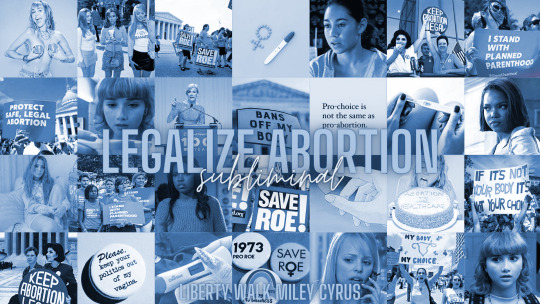
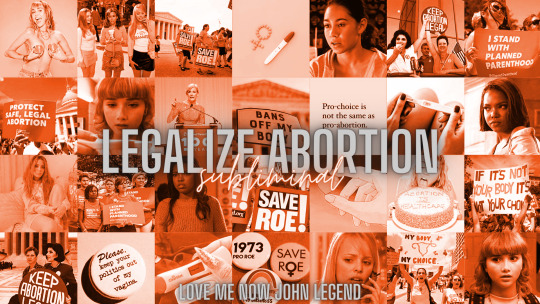



legalize abortion subliminal (song versions) pt 2
#legal#legalize#abortion#pro choice#roe v wade#roe vs wade#save roe#katy perry#miley cyrus#jhene aiko#big sean#rich white ladies#john legend
1 note
·
View note
Text
Dogs Rule

View On WordPress
1 note
·
View note
Text
[moved over from a rage tweet thread, bare with me here]
According to a leaked draft, Alito is writing a decision overturning Roe. v. Wade, clearing the way for states legislatures, elected by increasingly small minorities, to outlaw abortion. This decision will kill women. Full stop.
The '6 week heartbeat bill' is actually neither. It's a functional all out ban of abortion. For one thing, the ban is NOT from 6 weeks from conception, but 6 weeks after your last period. The deadline is ~4 weeks pregnant, at most only 2 weeks late. You can't even get a pregnancy confirmed in time to schedule an abortion in Texas within that timeframe. For another, the fetal heart does not actually develop until about 20 weeks. Republicans just wanted to play on emotions of voters, not deal in actual facts
So if there was something wrong, a fetal abnormality with the heart or the brain? You better hope you live somewhere with laws and doctors who will allow you to make your own decisions in that incredibly difficult time. The safest and least emotionally damaging course might not be available to you, even before this court decision, even if you live in a liberal state. However multiple states will use this decision to ban abortions even in these cases, and even to prevent medical deaths.
You can not discount just how vital abortion rights are to protecting the lives of pregnant patients. While abortion is incredibly safe, Women in America are 250% more likely to die in pregnancy now than when Roe was decided. Black Americans are further 250% more likely to die in pregnancy than White Americans. Pregnancy should be getting safer, not more dangerous, but the emphasis has been placed on fetal protection even over protection of the adult patient. Women have literally died because doctors are afraid to intervene during miscarriages.
We don't talk about how incredibly common miscarriages are, but ~30% of first time pregnancies end in miscarriage. Yet Women are imprisoned for miscarrying, both here & abroad. Republicans claim they're not criminalizing pregnant patients but invariably prosecute women for attempting their own abortions, or for misunderstood miscarriages. That does not even cover the pregnant people who will die trying to obtain abortions when they can't go to a doctor. After the abortion restrictions signed by Rick Perry, it was estimated that 100,000-240,000 women in Texas attempted to self induce by 2015. Do you understand how incredibly dangerous that is? Wealthy women could leave the state for care, but less lucky patients were calling clinics asking what cleaners they could survive drinking. It was heartbreaking & dangerous. & it shouldn't need to be said, but no person should be forced to gestate and birth a human being.
Ruth Bader Ginsburg said it best, "It is essential to woman’s equality with man that she be the decisionmaker, that her choice be controlling, questioning, If you impose restraints that impede her choice, you are disadvantaging her because of her sex.”
To deny a teenager, a mother who can't make ends meet, a medical patient, the ability to make this life altering decision, this life saving decision, between themselves and their doctor is not just amoral, it is cruel, it is heartless. To pretend it wasn't after meaningfully removing their ability to choose to parent though? It's a cruelty in the name of political gain that can not hide behind the religion they claim to speak in the name of.
Because it is, solely in the name of political power consolidation. Roe was decided 7-2 in 1973, with five Republican appointees joining the decision. Through the 60s abortion was seen as a fringe issue protestant voters were unconcerned with. Republicans needed something to replace racialized hate on the campaign trail, and manufactured outrage for their voters. As a governor Reagan loosened abortion restrictions in 1967, but he called for the appointment of anti-abortion judges in 1980 to run for president.
So what do we do? In 2022, 50 years later, how do we support the people in our country? We can get sad, but then we need to get mad. They need to taste the full fury of 160 million women rising together. Operating in both the short direct small scale & the large national stage.
For yourselves and your loved ones. Order emergency contraception, NOW. http://nurx.com is one place to get it. Keep some ella or equivalent on hand for you and the women you care for. (Plan B is less effective in women 160 lbs and over, so get ella).
If you can, obtain abortion medications such as misoprostol. medication abortions are 95% effective when taken within the first 10 weeks of pregnancy. The risks, including those attributable to ectopic pregnancy are less than 1%. States have been banning the mailing of these pills but not because it is unsafe, simply to force impoverished women to continue unwanted pregnancies. Don't wait until the zip code lottery to get worse, order these medications now. Go out and protest. #shoutyourabortion story. make the people in your life hear you. and VOTE please for all our sakes, vote. and convince them to as well. The midterm elections - but also your local state elections - have never mattered more.
If abortion is not effectively protected by our constitution, republican legislatures can ban abortion in your state and a republican congress could pass abortion restrictions nation wide. We need to speak up, we need to say no to online propaganda.
We need to elect sane people. Our lives depend on it.
48 notes
·
View notes
Text
My MET Gala List
Anya Taylor-Joy
Zendaya
Sadie Sink
Elle Fanning
Dakota Fanning
Margot Robbie
AnnaSophia Robb
Sarah Hyland
Lily Collins
Madelaine Petsch
Camila Mendes
Saoirse Ronan
Melissa McCarthy
Florence Pugh
Rebecca Ferguson
Halle Berry
Keke Palmer
Miranda Cosgrove
Madison Pettis
Millie Bobby Brown
Awkwafina
Amy Adams
Jessica Alba
Jessica Chastain
Phillipa Soo
Lupita Nyong’o
Gal Gadot
Anna Kendrick
Blake Lively
Jessica Biel
Ariel Winter
Winona Ryder
Zoe Saldana
Charlize Theron
Natalia Dyer
Nicole Kidman
Emilia Clarke
Gugu Mbatha-Raw
Idina Menzel
Viola Davis
Emily Blunt
Sofía Vergara
Meryl Streep
Anne Hathaway
Amanda Seyfried
Constance Wu
Elizabeth Olsen
Ana de Armas
Karen Gillan
Beanie Feldstein
Lin-Manuel Miranda
Hugh Jackman
Daveed Diggs
Jared Leto
Finn Wolfhard
Tom Holland
James McAvoy
Leslie Odom Jr.
Regé-Jean Page
Ryan Reynolds
Chris Hemsworth
KJ Apa
Idris Elba
David Harbour
Caleb McLaughlin
Bill Skarsgård
Alexander Skarsgård
John Krasinski
Stanley Tucci
Charlie Heaton
Robert Downey Jr.
Taron Egerton
Selena Gomez
Ariana Grande
Beyoncé
Rihanna
Halle Bailey
Chloe Bailey
Alessia Cara
Alicia Keys
Céline Dion
Taylor Swift
Lady Gaga
Ciara
Cassie
Elton John
The Weeknd
Lily-Rose Depp
Cara Delevingne
Taylor Hill
Elsa Hosk
Josephine Skriver
Romee Strijd
Jasmine Tookes
Lais Ribeiro
Sara Sampaio
Heidi Klum (does she even still model?)
Candice Swanepoel
Rosie Huntington-Whiteley
Behati Prinsloo
Miranda Kerr
Adut Akech
Paloma Elsesser
Kaia Gerber
Adriana Lima
Alessandra Ambrosio
Gisele Bündchen
Valentina Sampaio
Karlie Kloss (does she even still model?)
Gigi Hadid
Bella Hadid
Kendall Jenner
Lily Aldridge
Soo Joo Park
Paris Jackson
Daphne Groeneveld
Blanca Padilla
Sophie Turner
Nick Jonas
Jennifer Lopez
Billie Eilish
Billy Porter
Zoë Kravitz
Tiffany Haddish
Dakota Johnson
Kerry Washington
Mindy Kaling
Donatella Versace
Anna Wintour
Vera Wang
Tory Burch
Benedict Cumberbatch
Serena Williams
Kasey Musgraves
Katy Perry
Frank Ocean
Julianne Moore
Michael B. Jordan
Jordan Peele
Janelle Monáe
Ashley Graham
Mary-Kate Olsen
Ashley Olsen
Jennifer Connelly
Irina Shayk
Diane von Furstenberg
Gabrielle Union-Wade
Jeremy Scott (designer for Moschino)
Katie Holmes
Emily Ratajkowski
Gwen Stefani
Julia Garner
Angelina Jolie
Alicia Vikander
Lizzo
Adwoa Aboh
Jourdan Dunn
RuPaul
Solange Knowles
Billie Lourd
Daisy Ridley
John Boyega
Emma Stone
Bri Larson
Rita Ora
Dua Lipa
Naomi Scott
Law Roach
Kate Moss
Victoria Beckham
David Beckham
Mila Kunis
Natalie Portman
Zoey Deutch
Halsey
Michelle Williams
Kiernan Shipka
Rachel McAdams
Florence Welch
Danielle Bernstein (@weworewhat on Instagram)
Grace Elizabeth
Joey King
Dan Stevens
Christian Siriano
Jeremy Scott
Alessandro Michele (designer for Gucci)
Miuccia Prada
Elie Saab
Iris Van Herpen
Han Chong (designer for Self-Portrait)
Maria Grazia Chiuri (designer for Christian Dior)
Anthony Vaccarello (designer for Saint Laurent)
Silvia Ventura Fendi
Giambattista Valli
Zuhair Murad
Virginie Viard (designer for Chanel)
Ben Affleck
Elaine Welteroth
Nina Garcia
Imaan Hammam
Sara Paulson
Julia Roberts
Brandon Maxwell
Pierpaolo Piccioli (designer for Valentino)
Yara Shahidi
Gemma Chan
Laverne Cox
Lucy Boynton
Naomi Campbell
Penelope Cruz
Salma Hayek
Gwyneth Paltrow
Rami Malek
Sienna Miller
Aurora James
Carey Mulligan
Charli XCX
Alexa Chung
Stella Maxwell
Sofía Sánchez Barrenechea
Dapper Dan
Aquaria
Normani
Camila Coelho
Deepika Padukone
Tommy Hilfiger
Violet Chachki
Nasiba Adilova
Shailene Woodley
Ansel Elgort
Joe Jonas
Megan Fox
Laura Haddock
Orlando Bloom
Willow Smith
Jason Sudeikis
Ewan McGregor
Coco Rocha
Ralph Lauren
BTS - Jungkook, V, Park Ji-min, Jin, Suga, RM, J-Hope
Blackpink - Jennie, Lisa, Rosé, Jisoo
Doja Cat
Sam Claflin
Kiera Knightley
Alexina Graham
Rachel Zegler
Sophia Lillis
Sam Smith
Mimi Cuttrell
Aubrey Plaza
Adam Driver
Kate McKinnon
Aidy Bryant
Thomasin McKenzie
Maddie Ziegler
Kristen Bell
Idina Menzel
Michelle Dockery
Chris Evans
Peter Dinklage
Luke Evans
Liam Hemsworth
Robert Pattinson
Christian Louboutin
Stuart Weitzman
Nicola Glass (designer for Kate Spade)
Michael Kors
Manolo Blahnik
Alberta Ferretti
Kim Jones (designer for Fendi)
Viktor Horsting
Rolf Snoeren
Richard Madden
Giorgio Armani
Isabel Marant
Nicky Zimmermann
Simone Zimmermann
Gimmo Etro
Austin Butler
Abigail Breslin
Lana Del Rey
Natalia Dyer
Molly Ringwald
Adele
Giambattista Valli
Tamara Ralph
Michael Russo
Isla Fisher
Anastasia Soare (founder of Anastasia Beverly Hills)
Charlotte Tilbury
Allan Avendaño
Danielle Priano
Pier Gelardi (founder of Refinery29)
Philippe von Borries (founder of Refinery29)
Christene Barberich (founder of Refinery29)
Justin Stefano (founder of Refinery29)
Sara Moonves (editor-in-chief for W Magazine)
Arnaud de Contades (CEO of Marie Claire Magazine)
Anne Fullenwider (editor-in-chief of Marie Claire Magazine)
Lauren Conrad
Miles Socha (editor-in-chief of Women’s Wear Daily)
Jay Penske (CEO of Women’s Wear Daily)
Jessica Pels (editor-in-chief for Cosmopolitan Magazine)
Rob Zangardi
Mariel Haenn
Michael Fassbender
Elliot Page
Betsey Johnson
Jonathan Groff
Anna Faris
Meryl Streep
Brie Larson
Renée Elise Goldsberry
Jasmine Cephas Jones
Cindy Crawford
Nicholas Hoult
Zac Posen
Taraji P. Henson
Joan Smalls
Samira Nasr (editor-in-chief of Harper’s Bazaar Magazine)
Lily James
Thandiwe Newton
Ciara Bravo
Mary Elizabeth Winstead
Phoebe Dynevor
Allison Janney
Daniel Levy
Claire Foy
Lisa Eldridge
Kale Teter
LaQuan Smith
Lacy Redway
Alexandra DiRoma
Alex White (fashion director for Elle Magazine U.S.)
Carine Roitfeld (founder and editor-in-chief of CR Fashion Book)
Carine Backoff
Zoey Grossman
Tyler Shields
Greg Williams
Cass Blackbird
Kacey Musgraves
Owen Gould
Tobi Henney
Marc Eram
Charlotte Prevel
Romy Soleimani
Rebecca Minkoff
Joseph Altuzarra
Gabriela Heart (designer for Chloé)
Hedi Slimane (designer for Céline)
Phoebe Philo (designer for Céline)
Jonathan Anderson (designer for Loewe)
Saweetie
Kelsey Deenihan Fisher
Lorde
Demna Gvasalia (designer for Balenciaga)
Anok Lai
Precious Lee
Storm Reid
Jennifer Hudson
Maisie Williams
Tom Ford
Iman Abdulmajid
Ella Emhoff
Pete Davidson
Regina King
Amandla Stenberg
Eiza González
Stella McCartney
Vittora Ceretti
Leslie Grace
Alton Mason
Mary J. Blige
Carey Mulligan
Ming Xi
Donald Glover
Brooke Shields
Tracee Ellis Ross
Maya Hawke
Symone
Chiara Ferragni
Laura Dern
Anthony Mackie
Pharrell Williams
Frank Ocean
Joe Alwyn
Queen Latifah
Jason Wu
Shawn Mendes
Camila Cabello
(358-390 are new! If I think of ten more, then I’ll reblog this post and add them. I had this in the drafts for too long and I still could not think of anyone...)
NOT Invited
Justin Bieber
Hailey Baldwin
Cole Sprouse
Lili Reinhart
Kim Kardashian
Khloé Kardashian
Kris Jenner
Caitlyn Jenner
Kylie Jenner
Emma Chamberlain
Addison Rae
Charlie D'Amelio (she’s a minor anyhow, but even if she was 18 or older, she still doesn’t deserve to be invited. 😊)
Dixie D'Amelio
James Charles
Cardi B
Nicki Minaj
Miley Cyrus
Priyanka Chopra
Jeffree Star
ALL social media influencers (YouTube, TikTok, Instagram)
Lena Dunham
John Legend
Chrissy Teigen
Kanye West
Demi Lovato
Doutzen Kroes
Ezra Miller
Winnie Harlow
Chloë Grace Moretz
Johnny Depp
Amber Heard
Armie Hammer
Kristen Stewart
Travis Scott
Emma Roberts
Tom Cruise
Olivia Rodrigo
Hailee Steinfeld
Henry Cavill
Alida Morberg (Bill Skarsgård’s problematic “girlfriend”)
David Dobrik
Madison Beer
Domenico Dolce
Stefano Gabbana
Dove Cameron
Sabrina Carpenter
Lil Nas X
Harry Styles
Olivia Wilde
Alexander Wang
Justin Timberlake
Madonna
Justin Timberlake
Adam Levine
Sebastian Stan
Alejandra Onieva
Machine Gun Kelly
21 Savage
Barbara Palvin
French Montana
Chris Pratt
Bella Thorne
Scarlett Johansson
Jennifer Lawrence
Emma Watson
Vanessa Hudgens
Sacha Baron Cohen
Dylan Sprouse
Ashton Kutcher
Sarah Jessica Parker
Zayn Malik
Olivia Jade
Kid Cudi
Channing Tatum
Paris Hilton
Nicky Hilton
A$AP Rocky
Jeremy O. Harris
Timothée Chalamet
John Mulaney
Olivia Munn
Elon Musk
♡ September 12, 2021 November 25, 2021 ♡
33 notes
·
View notes
Photo
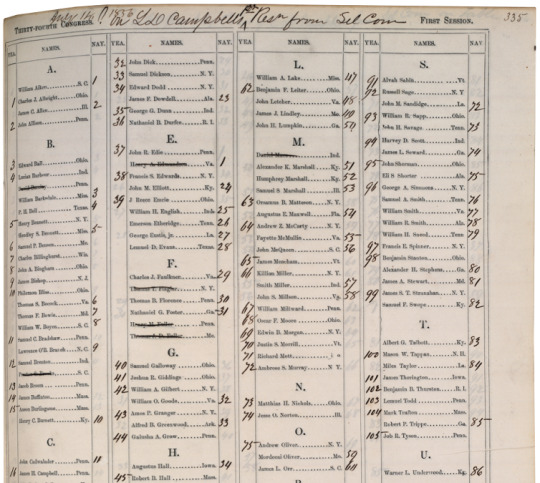
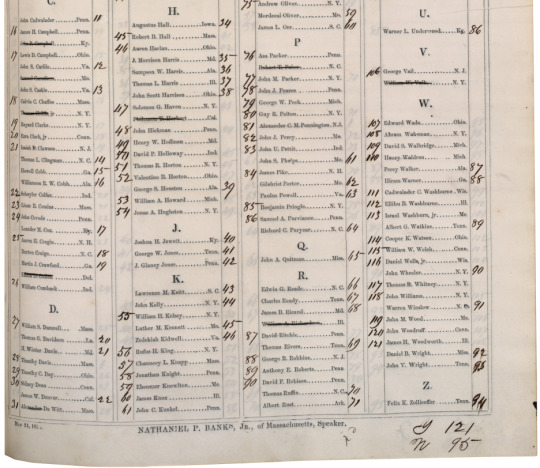
Roll Call Tally on the Expulsion of Preston Brooks, 7/14/1856
After Preston Brooks beat Charles Sumner nearly to death with a cane in the Senate chamber, the House voted on whether to expel him from Congress. They failed to reach the two-thirds majority needed.
Series: General Records, 1791 - 2010
Record Group 233: Records of the U.S. House of Representatives, 1789 - 2015
Transcription:
July 14. 1856
On LD Campbells 1st Resn from Sel Com
THIRTY-FOURTH CONGRESS
FIRST SESSION
335
[column one]
YEA | NAMES. | NAY.
A.
|William Aiken...S.C. | 1
1 | Charles J. Albright...Ohio. |
| James C. Allen...Ill. | 2
2| John Allison...Penn. |
B.
3 | Edward Ball...Ohio |
4 | Lucian Barbour...Ind. |
|David Barclay [struck through] |
| William Barksdale...Miss. | 3
| P.H. Bell...Texas. | 4
5 | Henry Bennett...N.Y. |
| Hendley S. Bennett...Miss. | 5
6 | Samuel P. Benson...Me. |
7 | Charles Billinghurst...Wis |
8 | John A. Bingham...Ohio |
9 | James Bishop...N.J. |
10 | Philemon Bliss...Ohio |
| Thomas S. Bocock...Va. | 6
| Thomas F. Bowie...Md. | 7
| William W. Boyce...S.C. | 8
11 | Samuel C. Bradshaw...Penn. |
| Lawrence O'B. Braneh...N.C. | 9
12 | Samuel Brenton...Ind. |
| Preston S. Brooks [struck through]...S.C. |
13 | Jacob Broom...Penn. |
14 | James Buffinton...Mass. |
15 | Anson Burlingame...Mass. |
| Henry C. Burnett...Ky. | 10
C.
| John Cadwalader...Penn. | 11
16 | James H. Campbell...Penn. |
|John P. Campbell [struck through]...Ky. |
17 | Lewis D. Campbell...Ohio |
| John S. Carlile...Va. | 12
| Samuel Caruthers [struck through]...Mo. |
| John S. Caskie...Va. | 13
18 | Calvin C. Chaffee...Mass. |
| Thomas Child, jr [struck through] ...N.Y. |
19 | Bayard Clarke...N.Y. |
20 | Ezra Clark, jr...Conn. |
21 | Isaiah D. Clawson...N.J. |
| Thomas L. Clingman...N.C. | 14
| Howell Cobb...Ga. | 15
| Williamson R.W. Cobb...Ala. | 16
22 | Schuyler Colfax...Ind. |
23 | Linus B. Comins...Mass. |
24 | John Covode...Penn. |
| Leander M. Cox...Ky. | 17
25 | Aaron H. Cragin...N.H. |
| Burton Craige...N.C. | 18
| Martin J. Crawford...Ga. | 19
| Elisha D. Cullen [struck through]...Del. |
26 | William Cumback...Ind. |
D.
27 | William S. Damrell...Mass. |
| Thomas G. Davidson...La. | 20
| H. Winter Davis...Md. | 21
28 | Timothy Davis...Mass. |
29 | Timothy C. Day...Ohio. |
30 | Sidney Dean...Conn. |
| James W. Denver...Cal. | 22
31| Ale["xander" struck through] De Witt...Mass. |
[Column Two]
YEA. | NAMES. | NAY.
32 | John Dick...Penn. |
33 | Samuel Dickson...N.Y. |
34 | Edward Dodd...N.Y. |
| James F. Dowdell...Ala. | 23
35 | George G. Dunn...Ind. |
36 | Nathaniel B. Durfee...R.I. |
E.
37 | John R. Edie...Penn. |
| Henry A. Edmundson [struck through] ...Va. | 1
38 | Francis S. Edwards...N.Y. |
| John M. Elliott...Ky. | 24
39 | J Reece Emrie...Ohio. |
| William H. English...Ind. | 25
| Emerson Etheridge...Tenn. | 26
| George Eustis, jr...La. | 27
| Lemuel D. Evans...Texas. | 28
F.
| Charles J. Faulkner...Va. | 29
| Thomas T. Flagler [struck through]...N.Y. |
| Thomas B. Florence...Penn. | 30
| Nathaniel G. Foster...Ga. | - 31
| Henry M. Fuller [struck through] ...Penn. |
| Thomas J. D. Fuller [struck through] ...Me. |
G.
40 | Samuel Galloway...Ohio. |
41 | Joshua R. Giddings...Ohio. |
42 | William A. Gilbert...N.Y. |
| William O. Goode...Va. | 32
43 | Amos P. Granger...N.Y. |
| Alfred B. Greenwood...Ark. | 33
44 | Galusha A. Grow...Penn. |
H.
| Augustus Hall...Iowa. | 34
45 | Robert B. Hall...Mass |
46 | Aaron Harlan...Ohio. |
| J. Morrison Harris...Md. | 35
| Sampson W. Harris...Ala. | 36
| Thomas L. Harris...Ill. | 37
| John Scott Harrison...Ohio. | 38
47 | Solomon G. Haven...N.Y. |
| Philemon T. Herbert...Cal. |
48 | John Hickman...Penn. |
49 | Henry W. Hoffman...Md. |
50 | David P. Holloway...Ind. |
51 | Thomas R. Horton...N.Y. |
52 | Valentine B. Horton...Ohio. |
| George S. Houston...Ala. | 39
53 | William A. Howard...Mich. |
54 | Jonas A. Hughston...N.Y. |
J.
| Joshua H. Jewett...Ky. | 40
| George W. Jones...Tenn. | 41
| J. Glancy Jones...Penn. | 42
K.
| Lawrence M. Keitt...S.C. | 43
| John Kelly...N.Y. | 44
55 | William H. Kelsey...N.Y. |
| Luther M. Kennett...Mo. | 45
| Zedekiah Kidwell...Va. | 46
56 | Rufus H. King...N.Y. |
57 | Chauncey L. Knapp...Mass. |
58 | Jonathan Knight...Penn. |
59 | Ebenezer Knowlton...Me. |
60 | James Knox...Ill. |
61 | John C. Kunkel...Penn. |
[Column Three]
YEA. | NAMES. | NAY.
L.
| William A. Lake...Miss. | 47
62 | Benjamin F. Leiter...Ohio. |
| John Letcher...Va. | 48
| James J. Lindley...Mo. | 49
| John H. Lumpkin...Ga. | 50
M.
| Daniel Mace [struck through] ...Ind. |
| Alexander K. Marshall...Ky. | 51
| Humphrey Marshall...Ky. | 52
| Samuel S Marshall...Ill. | 53
63 | Orsamus B. Matteson...N.Y. |
| Augustus E. Maxwell...Fla. | 54
64 | Andrew Z. McCarty...N.Y. |
| Fayette McMullin...Va. | 55
| John McQueen...S.C. | 56
65 | James Meacham...Vt. |
66 | Killian Miller...N.Y. |
| Smith Miller...Ind. | 57
| John S. Millson...Va. | 58
67 | William Millward...Penn. |
68 | Oscar F. Moore...Ohio. |
69 | Edwin B. Morgan...N.Y. |
70 | Justin S. Morrill...Vt. |
71 | Richard Mott...i o |
72 | Ambrose S. Murray...N.Y. |
N.
73 | Matthias H. Nichols...Ohio |
74 | Jesse O. Norton...Ill. |
O.
75 | Andrew Oliver...N.Y. |
| Mordecai Oliver...Mo. | 59
| James L. Orr...S.C. | 60
P.
76 | Asa Packer...Penn. |
| Robert T. Paine [struck through] ...N.C. |
77 | John M. Parker...N.Y. |
78 | John J. Pearce...Penn. |
79 | George W. Peek...Mich. |
80 | Guy R. Pelton...N.Y. |
81 | Alexander C.M. Pennington. N.J. |
82 | John J. Perry...Me. |
83 | John U. Pettit...Ind. |
| John S. Phelps...Mo. | 61
84 | James Pike...N.H. |
| Gilchrist Porter...Mo. | 62
| Paulus Powell...Va. | 63
85 | Benjamin Pringle...N.Y. |
86 | Samuel A. Purviance...Penn. |
| Richard C. Puryear...N.C. | 64
Q.
| John A. Quitman...Miss. | 65
R.
| Edwin G. Reade...N.C. | 66
| Charles Ready...Tenn. | 67
| James B. Ricaud...Md. | 68
| William A. Richardson [struck through] ...Ill. |
87 | David Ritchie...Penn. |
| Thomas Rivers...Tenn. | 69
88 | George R. Robbins...N.J. |
89 | Anthony E. Roberts...Penn |
90 | David F. Robison...Penn. |
| Thomas Ruffin...N.C. | 70
| Albert Rust...Ark. | 71
[Column Four]
YEA. | NAMES. | NAY.
S.
91 | Alvah Sabin...Vt. |
92 | Russell Sage...N.Y. |
| John M. Sandidge...La. | 72
93 | William R. Sapp...Ohio. |
| John H. Savage...Tenn. | 73
94 | Harvey D. Scott...Ind. |
| James L. Seward...Ga. | 74
95 | John Sherman...Ohio. |
| Eli S Shorter...Ala. | 75
96 | George A. Simmons...N.Y. |
| Samuel A. Smith...Tenn. | 76
| William Smith...Va. | 77
| William R. Smith...Ala. | 78
| William H. Sneed...Tenn. | 79
97 | Francis E. Spinner...N.Y. |
98 | Benjamin Stanton...Ohio. |
| Alexander H. Stephens...Ga. | 80
| James A. Stewart...Md. | 81
99 | James S.T. Stranahan...N.Y. |
| Samuel F. Swope...Ky. | 82
T.
| Albert G. TAlbott...Ky. | 83
100 | Mason W. Tappan...N.H. |
| Miles Taylor...La. | 84
101 | James Thorington...Iowa. |
102 | Benjamin B. Thurston...R.I. |
103 | Lemuel Todd...Penn. |
104 | Mark Trafton...Mass |
| Robert P. Trippe...Ga. | 85
105 | Job R. Tyson...Penn. |
U.
| Warner L. Underwood...Ky. | 86
V.
106 | George Vail...N.J. |
| William W. Valk [struck through] ...N.Y. |
W.
107 | Edward Wade...Ohio. |
108 | Abram Wakeman...N.Y.
109 | David S. Walbridge...Mich. |
110 | Henry Waldron...Mich |
| Percy Walker...Ala. | 87
| Hiram Warner...Ga. | 88
111 | Cadwalader C. Washburne, Wis. |
112 | Ellihu B. Washburne...Ill. |
113 | Israel Washburn, jr...Me. |
| Albert G. Watkins...Tenn. | 89
114 | Cooper K. Watson...Ohio.|
115 | William W. Welch...Conn. |
116 | Daniel Wells, jr...Wis. |
| John Wheeler...N.Y. | 90
117 | Thomas R. Whitney...N.Y. |
118 | John Williams...N.Y. |
| Warren Winslow...N.C. | 91
119 | John M. Wood...Me. |
120 | John Woodruff...Conn. |
121 | James H. Woodworth...Ill. |
| Daniel B. Wright...Miss. | 92
| John V. Wright...Tenn. | 93
Z.
| Felix K. Zollicoffer...Tenn. | 94
[end columns]
MAY 21, 1856
NATHANIEL P. BANKS, JR., of Massachusetts, Speaker.
ex [sideways]
Y 121
N 95
#archivesgov#July 14#1856#1800s#antebellum#slavery#Kansas-Nebraska Act#violence#U.S. Congress#Senate
48 notes
·
View notes
Text
she snatched her man, her phone & her baby
218 notes
·
View notes
Link
In 2013, Texas passed House Bill 2 (HB2), which placed new, more stringent regulations on abortion clinics. The World Health Organization has classified abortion as a safe procedure for outpatient clinics and physician’s offices, which is where 95% of abortions take place in the U.S, according to the National Abortion Federation (NAF), the professional association for abortion providers. But HB2 mandated, among other things, that providers must come into compliance with ambulatory surgery center (ASC) standards. ASCs are a step up from medical offices and provide outpatient surgeries that do not require hospital stays—think knee replacements—requiring facilities to include at least one dedicated operating room. HB2 meant that abortion providers across Texas had to upgrade corridor widths, door and exam room sizes, and HVAC systems, among other things. HB2, proponents argued, would help protect women with a higher standard of care. “This is an important day for those who support life and for those who support the health of Texas women,” said then-Governor Rick Perry when the legislation passed.
For Hagstrom Miller and opponents of HB2, the true intent of the law was obvious, and it wasn’t about patient well-being. The legislation has “nothing to do with the actual procedure that we’re providing,” Hagstrom Miller says. The statutes “were imposed on us because the opposition knew it would be extremely difficult to comply, and it would be incredibly onerous and expensive.”
HB2 is what’s known as a Targeted Regulation of Abortion Providers—or TRAP—law. TRAP refers to legislation specifically related to the physical building, equipment, and staffing requirements of a facility that performs abortions, according to Elizabeth Nash, senior state issues manager at the Guttmacher Institute, a sexual and reproductive health and rights research and policy nonprofit. The term was coined by the Center for Reproductive Health in the 1990s, Nash says, but zoning and building codes were used to limit abortion clinics as soon as the landmark Supreme Court case Roe v. Wade made abortion legal in 1973. Following the 2010 midterm elections, when many state and local legislatures went red, hundreds of new TRAP laws were passed in the U.S. Far from being motivated by a question of safety, Nash says, TRAP laws in the last decade have become the primary tool used to hinder access to legal abortion care in America.
read more
11 notes
·
View notes